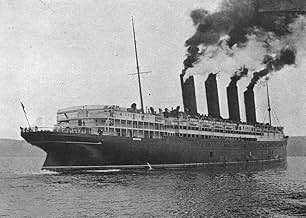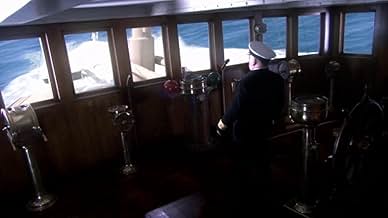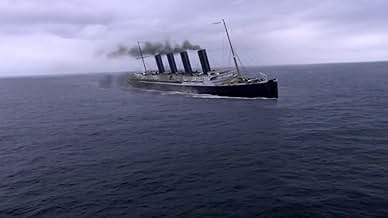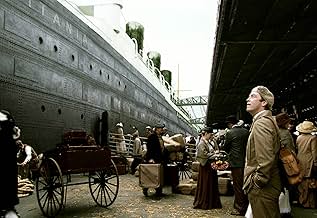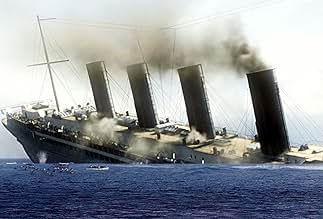Der Untergang der Lusitania - Tragödie eines Luxusliners
Originaltitel: Lusitania: Murder on the Atlantic
- Fernsehfilm
- 2007
- 1 Std. 30 Min.
IMDb-BEWERTUNG
6,9/10
687
IHRE BEWERTUNG
Füge eine Handlung in deiner Sprache hinzuA dramatization of the notorious World War I torpedoing of the ocean liner, RMS Lusitania.A dramatization of the notorious World War I torpedoing of the ocean liner, RMS Lusitania.A dramatization of the notorious World War I torpedoing of the ocean liner, RMS Lusitania.
- Regie
- Drehbuch
- Hauptbesetzung
Florian Panzner
- Lt. Capt. Schwieger
- (as Florian Panzer)
Madeleine Garrood
- Avis Dolphin
- (as Maddeleine Garrood)
Andre Weideman
- Johnston
- (as Andre Weiderman)
Stephen Jennings
- Carson
- (as Steven Jennings)
Robyn LeAnn Scott
- Peggy
- (as Robyn Scott)
Empfohlene Bewertungen
The movie was okay and the cast did a wonderful job delivering the emotional impact the movie should have. What also worked was the actual footage at the end. What was horrible was depicting Winston Churchill and the British hierarchy as actually evil. That was unnecessary and pure nonsense.
Movies about the Titanic have come and gone and many such movies, from blockbuster epics to cheap low budget movies (some were so low budgeted that the camera crews tilted their cameras instead of tilting the set!) have made their way from the movie theater and the TV, to video and later to DVD.
Yet little has been said about the Lusitania, whose sinking opened a lot of potential.
The story behind the Titanic can be summed up as follows:
Ship sets sail on its maiden voyage.
Ship hits an iceberg.
Ship sinks in the mid Atlantic.
Casualties mount.
A few survive.
End of the story.
But the Lusitania had a story far more complex. Were they bringing arms to England? Were passengers warned? Were dispatches sent to the Captain? Was the Captain innocent? Or was he guilty? These are complex questions with no real simple answers.
The movie was very well done and sure, some facts were distorted. It was war. And every historian knows that the first casualty in a war is the Truth.
Unlike TITANIC (1998), the central characters in this feature were not fictitious. They really did exist. Prof. Ian Holbourn (born November 5, 1872 and died September 15, 1935) was a passenger on the Lusitania. And he really befriended a young girl named Avis Dolphin (born 1903? and died February 5,1996).
And that "good German" on the U-boat that sank the Lusitania was not a fictitious character added to keep things politically correct, either. He also existed. Quartermaster Charles Vogele allegedly refused to relay the order to fire the torpedo and he was tried and courts-marshaled, and spend 3 years in prison for his crime. (Some accounts claimed that Voegele was an electrician, not a Quartermaster.)
It was no secret that Captain Turner later admitted that had the roles been reversed, he wouldn't had behaved any differently than Lt. Capt. Schwieger, who gave the order to fire that torpedo.
I rate this movie an 9 out of 10.
Yet little has been said about the Lusitania, whose sinking opened a lot of potential.
The story behind the Titanic can be summed up as follows:
Ship sets sail on its maiden voyage.
Ship hits an iceberg.
Ship sinks in the mid Atlantic.
Casualties mount.
A few survive.
End of the story.
But the Lusitania had a story far more complex. Were they bringing arms to England? Were passengers warned? Were dispatches sent to the Captain? Was the Captain innocent? Or was he guilty? These are complex questions with no real simple answers.
The movie was very well done and sure, some facts were distorted. It was war. And every historian knows that the first casualty in a war is the Truth.
Unlike TITANIC (1998), the central characters in this feature were not fictitious. They really did exist. Prof. Ian Holbourn (born November 5, 1872 and died September 15, 1935) was a passenger on the Lusitania. And he really befriended a young girl named Avis Dolphin (born 1903? and died February 5,1996).
And that "good German" on the U-boat that sank the Lusitania was not a fictitious character added to keep things politically correct, either. He also existed. Quartermaster Charles Vogele allegedly refused to relay the order to fire the torpedo and he was tried and courts-marshaled, and spend 3 years in prison for his crime. (Some accounts claimed that Voegele was an electrician, not a Quartermaster.)
It was no secret that Captain Turner later admitted that had the roles been reversed, he wouldn't had behaved any differently than Lt. Capt. Schwieger, who gave the order to fire that torpedo.
I rate this movie an 9 out of 10.
I saw the docudrama today, thanks to Youtube, and can't support the criticism of the two other reviews here at all. Imho this BBC movie is a very good effort at educating the public about this crucial episode of history, regarding the constraints of the budget and the running time of the movie.
As a German citizen, I am, of course, not a totally impartial party (even though I try hard to be), but neither are British nor American commenters. However, I have read one of the most comprehensively sourced books on the subject, Colin Simpson's "The Lusitania", as well as countless in formations on the Internet and I'm basing my judgment on the facts that historians agree on, something that is lacking from both other reviews. And, as I see it, this BBC film got the most important facts right, while at the same time offering great acting and a storyline that shows the human side of the tragedy.
To the facts: - The Lusitania transported ammunition for the British war efforts, and this has been proved with documentary evidence. The movie mentions the fact, without going into the length of telling us that not only British officials knew this, but also US ones, as well as the German intelligence service. Since the complex US and German subplot would have taken a lot of time to tell (and introduce a lot of additional players), it is understandable that the movie leaves this side out. However, personally, I would have liked that a least a mention of the overwhelmingly pro-British tendency of the Wilson administration (especially the role of Col. House) would have been made, but it may have made the storyline too confusing.
Only the most important facts, and imho they are covered in a fair and still entertaining way by the movie. It would have been impossible to show every detail in a 90 minute feature, but the viewers get a good summary, which stay close to the view of the historians. And there isn't an especially pro-German bias (hey, it's a BBC production!). The hypocritical stance of the German Kaiser and his Admirals, who didn't want to be remembered of their own orders after public opinion turned against them is exposed, and German sub captain Schwieger is shown as a somewhat weak character, drawn between ambition, orders, and what may still have been left of ethical values. If there's any bias at all it's pro-American, because US officials, who put their countrymen into danger by deliberately ignoring the illegal transport of war supplies on a British passenger ship, aren't given any scrutiny at all. But, OK, this sideline would have taken another 20 minutes or so to tell.
So, all in all, a very good docudrama combining historical facts with good storytelling an cinematographic values. The special effects, the appearance of the Lusitania and the sub, don't look too cheap (which is often the problem with docudramas), also the use of historical coverage is accomplished in a convincing way. Taking also in consideration the good acting, especially the performances of John Hannah ("Four Weddings And A Funeral") and Adrian Topol, this movie deserves 8-9 out of 10 points. Job well done, BBC!
As a German citizen, I am, of course, not a totally impartial party (even though I try hard to be), but neither are British nor American commenters. However, I have read one of the most comprehensively sourced books on the subject, Colin Simpson's "The Lusitania", as well as countless in formations on the Internet and I'm basing my judgment on the facts that historians agree on, something that is lacking from both other reviews. And, as I see it, this BBC film got the most important facts right, while at the same time offering great acting and a storyline that shows the human side of the tragedy.
To the facts: - The Lusitania transported ammunition for the British war efforts, and this has been proved with documentary evidence. The movie mentions the fact, without going into the length of telling us that not only British officials knew this, but also US ones, as well as the German intelligence service. Since the complex US and German subplot would have taken a lot of time to tell (and introduce a lot of additional players), it is understandable that the movie leaves this side out. However, personally, I would have liked that a least a mention of the overwhelmingly pro-British tendency of the Wilson administration (especially the role of Col. House) would have been made, but it may have made the storyline too confusing.
- Not only ammunition, but also military personnel on the way to the war zone was transported. The movie doesn't show this, probably because it would have necessitated to introduce additional characters.
- As the movie mentions, the Lusitania was indeed on the list of British auxiliary cruisers. What the filmmakers doesn't tell us is that even basements for naval guns had been installed on the Lusitania after the war. Among passengers and staff, there were even rumours and that the guns were already hidden on the ship. Also mentioned by the BBC, contrary to agreed rules of naval warfare, Admiralty had issued orders to the merchant marine calling for deliberately ramming of submarines.
- It's a fact that British officials deliberately asked how the US would react if American citizen would be killed on a British ship. This is shown in the movie, even though it is left to the judgment of the viewers if and how this influenced the Admiralty in their decisions. The movie just shows the known facts, without taking a clear stance, which is a good idea regarding the lack of decisive evidence.
- The Germans had declared the waters an unrestricted war zone, and really warned passengers in the newspapers. The Lusitania, as a well known British ship, was in imminent danger, while at the same time neutrals, like American vessels, would have been relatively safe. Like the movie showed, it was dangerous ignorance in combination with misguided believe in the Admiralty safety promises that led many passengers to ignore the grave risk.
- The movie shows only one torpedo being fired. This is in accordance with German documents and testimonies, and the established view of historians worldwide. There has never been compelling evidence that more torpedoes were fired. The question, why the Lusitania sank so fast has never really been answered, the most recent view being that both the specific construction of the Ship (longitudinal bulkheads!) and an explosion of a boiler played a role. The movie doesn't show how the second explosion happened and so stays neutral on this question. Imho a good idea, because this isn't essential to the story.
- The Admiralty really did take an unfair stance in the court case, as depicted in the movie. Also, the order for the so called "advised course" contradicted other standing orders, as well as the necessities of navigation. And many important information were never relayed to the Lusitania. What isn't shown is that the Admiralty even presented doctored wireless logs, and that the judge noticed that. Maybe it would have been good to include this in the story, since it adds to the understanding of the administration-critical stance of the Judge, and of the consequent verdict.
Only the most important facts, and imho they are covered in a fair and still entertaining way by the movie. It would have been impossible to show every detail in a 90 minute feature, but the viewers get a good summary, which stay close to the view of the historians. And there isn't an especially pro-German bias (hey, it's a BBC production!). The hypocritical stance of the German Kaiser and his Admirals, who didn't want to be remembered of their own orders after public opinion turned against them is exposed, and German sub captain Schwieger is shown as a somewhat weak character, drawn between ambition, orders, and what may still have been left of ethical values. If there's any bias at all it's pro-American, because US officials, who put their countrymen into danger by deliberately ignoring the illegal transport of war supplies on a British passenger ship, aren't given any scrutiny at all. But, OK, this sideline would have taken another 20 minutes or so to tell.
So, all in all, a very good docudrama combining historical facts with good storytelling an cinematographic values. The special effects, the appearance of the Lusitania and the sub, don't look too cheap (which is often the problem with docudramas), also the use of historical coverage is accomplished in a convincing way. Taking also in consideration the good acting, especially the performances of John Hannah ("Four Weddings And A Funeral") and Adrian Topol, this movie deserves 8-9 out of 10 points. Job well done, BBC!
People always talk about Titanic this Titanic that, it was an accident waiting to happen. People died yes on that ship where it could have been averted. The Lusitania however, was the beginning and the end for the Germans and eventually lose World War One. The sinking of the ship was a barbaric act and no doubt a sad ending for those who died. Unlike the Titanic where there wasn't enough lifeboats, Lusitania had all the safety feature that was built into after Titanic like double hull and more then enough lifeboat for the passenger, but wasn't build to stop a torpedo.
The movie itself was really good. I'm surprise that guy from Mummy was in the movie and instead of being a comic relief, gave a very serious acting in the movie where he was a victim on the ship. The other people in the movie also showed the same and for a quality we expected in a docu-drama movie, the movie more the met my expectation. The sinking was very well done and was more sad then Titanic. Thank goodness there is none of this Jack and Rose crap in it.
Otherwise, a very well made movie and one that should be a reminder about how Lusitania became a pawn in the World War.
The movie itself was really good. I'm surprise that guy from Mummy was in the movie and instead of being a comic relief, gave a very serious acting in the movie where he was a victim on the ship. The other people in the movie also showed the same and for a quality we expected in a docu-drama movie, the movie more the met my expectation. The sinking was very well done and was more sad then Titanic. Thank goodness there is none of this Jack and Rose crap in it.
Otherwise, a very well made movie and one that should be a reminder about how Lusitania became a pawn in the World War.
Superb adaptation of the acclaimed book by Diane Preston. This film keeps close to the facts as it dramatizes the horrific sinking of the passenger liner Lusitana by a German submarine in the Great War. The tragedy of the sinking is all too realistically recreated and one can not be chilled to the bone how senseless this act truly was. John Hannah is superb as one of the passengers who befriends a young victim to be. This should be seen by all people everywhere so the Lusitania is never forgotten, so such an act is never repeated, and so those who died did not do so in vain. This will stand as an important document regarding the crimes of piracy committed by the German Empire 1914-1918.
Wusstest du schon
- WissenswertesThe U-20 set was the original U-96 set used in Das Boot (1981). The Type U-19 of World War I and Type VIIC of World War II had similar internal dimensions. The Lusitania scenes were filmed with full-scale sections of the ship off the coast of South Africa while the U-20 scenes were filmed at Bavaria Studios in Munich using the then-newly refurbished 25-year-old U-boat set, studio model and full-size prop originally built for the West German war film Das Boot (1981).
- PatzerOn at least two occasions the captain of the U 20 gives the order to "blow ballast" when he wants to dive the submarine. This order would result in all water being blown out of the ballast tanks and should only be given to surface the boat. In order to dive a submarine one must flood the ballast tanks with water.
- Zitate
Captain Turner: They're not interested in the truth.
- Crazy CreditsAdrian Topol's character name is pronounced Voegele in the German dialogue and is spelled this way in the accompanying English subtitles. However in the credits it is spelled Vogele. Correct German spelling uses either "ö" (o with an umlaut) or else "oe".
- VerbindungenFeatured in Titanic al detalle (2013)
Top-Auswahl
Melde dich zum Bewerten an und greife auf die Watchlist für personalisierte Empfehlungen zu.
Details
- Erscheinungsdatum
- Herkunftsländer
- Sprachen
- Auch bekannt als
- Sinking of the Lusitania: Terror at Sea
- Produktionsfirmen
- Weitere beteiligte Unternehmen bei IMDbPro anzeigen
Zu dieser Seite beitragen
Bearbeitung vorschlagen oder fehlenden Inhalt hinzufügen

